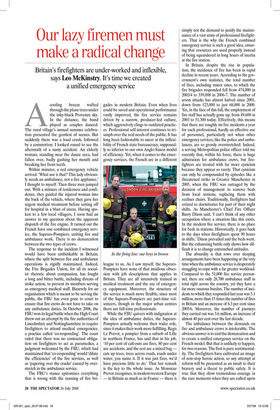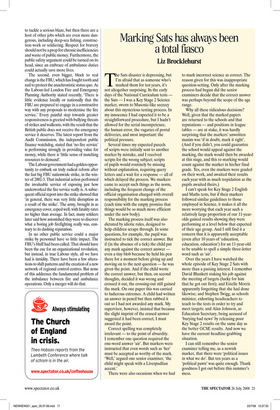Our lazy firemen must make a radical change
Britain’s firefighters are under-worked and inflexible, says Leo McKinstry. It’s time we created a unified emergency service Acooling breeze wafted through the plane trees under the inky-black Provence sky. In the distance, the band played as couples danced. The rural village’s annual summer celebration presented the gentlest of scenes. But suddenly there was a loud crash, followed by a commotion. I looked round to see the aftermath of a nasty accident. An elderly woman, standing near the dance area, had fallen over, badly gashing her mouth and breaking her front teeth.
Within minutes, a red emergency vehicle arrived. ‘What use is that? This lady obviously needs an ambulance, not a fire appliance,’ I thought to myself. Then three men jumped out. With a mixture of tenderness and confidence, they guided the injured woman into the back of the vehicle, where they gave her urgent medical treatment before setting off for hospital in a blast of sirens. Having spoken to a few local villagers, I soon had an answer to my question about the apparent dispatch of the fire engine. It turned out the French have one combined emergency service, the Sapeurs-Pompiers, uniting fire and ambulance work. There is no demarcation between the two types of crews.
The response to the incident I witnessed would have been unthinkable in Britain, where the split between fire and ambulance operations is rigidly maintained. Indeed, the Fire Brigades Union, for all its socialist rhetoric about compassion, has fought a long and bitter battle, including threats of strike action, to prevent its members serving as emergency medical staff. Bizarrely for an organisation which is meant to be serving the public, the FBU has even gone to court to ensure that fire crews do not have to take on any ambulance duties. In October 2006, the FBU won its legal battle when the High Court threw out an attempt by the fire authorities of Lincolnshire and Nottinghamshire to require firefighters to attend medical emergencies, a practice called ‘co-responding’. The court ruled that there was no contractual obligation on firefighters to act as paramedics, a judgment welcomed by the FBU, which had maintained that ‘co-responding’ would ‘dilute the efficiencies’ of the fire services, as well as ‘papering over the cracks’ caused by overstretch in the ambulance service.
The FBU’s stance epitomises everything that is wrong with the running of fire bri gades in modern Britain. Even when lives could be saved and operational performance vastly improved, the fire service remains driven by a narrow, producer-led culture, which aggressively clings to outdated practices. Professional self-interest continues to triumph over the real needs of the public. It has long been fashionable to sneer at the inflexibility of French state bureaucracy, supposedly so inferior to our own Anglo-Saxon model of efficiency. Yet, when it comes to the emergency services, the French are in a different league to us. As I saw myself, the SapeursPompiers have none of that insidious obsession with job descriptions that applies in Britain. They are all intensively trained in medical treatment and the use of emergency equipment. Moreover, the structure of the service is much more flexible, since most of the Sapeurs-Pompiers are part-time volunteers, though in the major urban centres there are full-time professionals.
While the FBU quivers with indignation at the idea of ambulance duties, the SapeursPompiers actually welcome their wider role, since it makes their work more fulfilling. Regis Le Prevot, a pompier from a suburb of Lille in northern France, has said that in his job, ‘10 per cent of call-outs are fires, 80 per cent are accidents, and the rest are a mixed bag — cats up trees, trees across roads, roads under water, you name it. If it was just fires, we’d have precious little to do.’ That last remark is the key to the whole issue. As Monsieur Prevot recognises, in modern western Europe — in Britain as much as in France — there is simply not the demand to justify the maintenance of a vast army of professional firefighters. That is the why the French combined emergency service is such a good idea, ensuring that resources are used properly instead of being squandered in long hours of inertia at the fire station.
In Britain, despite the rise in population, the incidence of fire has been in rapid decline in recent years. According to the government’s own statistics, the total number of fires, including minor ones, to which the fire brigades responded fell from 474,000 in 2003/4 to 339,000 in 2006-7. The number of arson attacks has almost halved since 2001, down from 123,000 to just 68,000 in 2000. Yet, in the face of this fall, the employment of fire staff has actually gone up, from 49,600 in 2003 to 51,300 today. Effectively, this means that there are roughly six fire incidents a year for each professional, hardly an effective use of personnel, particularly not when other emergency services, like the police and ambulances, are so grossly overstretched. Indeed, a serving Metropolitan police officer told me recently that, within his force, there is huge admiration for ambulance crews, but firefighters are treated with far more cynicism because they appear so rarely. That cynicism can only be compounded by episodes like a threatened strike in Greater Manchester in 2005, when the FBU was outraged by the decision of management to remove beds from local stations, replacing them with recliner chairs. Traditionally, firefighters had retired to dormitories for part of their night shifts. As Manchester’s Chief Fire Officer Barry Dixon said, ‘I can’t think of any other occupation where a situation like this exists. In the modern fire service, there is no place for beds in stations. Historically, it goes back to the days when firefighters spent 90 hours in shifts.’ Dixon prevailed and the beds went. But the exhausting battle only shows how difficult it is to change entrenched attitudes.
The absurdity is that rows over sleeping arrangements have been happening at the very time when the ambulance service is desperately struggling to cope with a far greater workload. Compared to the 51,000 fire service personnel, there are only 28,700 ambulance staff in total right across the country, yet they have a far more onerous burden. The number of incidents to which they responded last year was 5.1 million, more than 15 times the number of fires in Britain and an increase of 6.3 per cent since 2005/6. Moreover, the number of journeys they carried out was 3.6 million, an increase of almost 40 per cent over the last decade.
The imbalance between the demands on fire and ambulance crews is intolerable. The obvious answer is to end the demarcation and to create a unified emergency service on the French model. But that is unlikely to happen, for two reasons. The first is pure sentimentality. The firefighters have cultivated an image of non-stop heroic action, so any attempt at reform will be presented as an insult to their bravery and a threat to public safety. It is true that they show tremendous courage in the rare moments when they are called upon to tackle a serious blaze, but then there are a host of other jobs which are even more dangerous, including deep-sea fishing, construction work or soldiering. Respect for bravery should not be a prop for chronic inefficiencies and waste of public money. Furthermore, the public safety argument could be turned on its head, since an embrace of ambulance duties could actually save more lives.
The second, even bigger, block to real change is the FBU, which has fought tooth and nail to protect the anachronistic status quo. As the Labour-led London Fire and Emergency Planning Authority stated recently, ‘There is little evidence locally or nationally that the FBU are prepared to engage in a constructive way with any proposals to modernise the fire service.’ Every painful step towards greater responsiveness is greeted with bullying threats of strikes and walkouts, with the result that the British public does not receive the emergency service it deserves. The latest report from the Audit Commission, the independent public finance watchdog, stated that ‘no fire service’ is performing strongly in providing value for money, while there is ‘little sense of matching resources to demand’.
The Labour government had a golden opportunity to embark on truly radical reform after the last big FBU nationwide strike, in the winter of 2002-3. That industrial action performed the invaluable service of exposing just how underworked the fire service really is. A subsequent official report into the strike showed that ‘in general, there was very little disruption as a result of the strike’. The army, brought in as emergency cover, coped well, with fatality rates no higher than average. In fact, many soldiers later said how astonished they were to discover what a boring job firefighting really was, contrary to its dashing reputation.
In no other public service could a major strike by personnel have so little impact. The FBU’s bluff had been called. That should have been the cue for an organisational revolution, but instead, in true Labour style, all we have had is timidity. There have been a few alterations to shift patterns and the creation of a new network of regional control centres. But none of this addresses the fundamental problem of the imbalance between fire and ambulance operations. Only a merger will do that.



























































 Previous page
Previous page